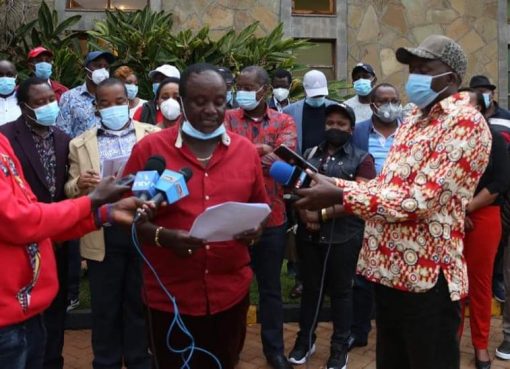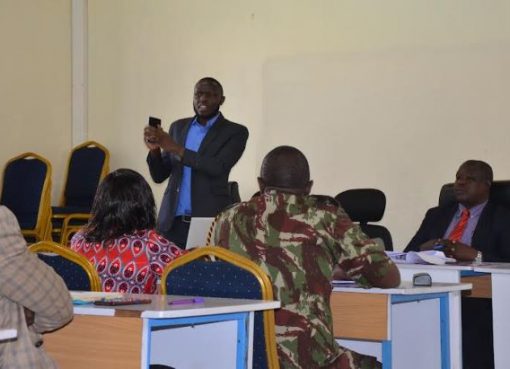The Kenya Private Sector Alliance (KEPSA) has officially signed a Memorandum of Understanding (MoU) with Kenya’s six Regional Economic Blocs, solidifying a strategic partnership to enhance public-private dialogue and economic development across counties.
The agreement, which adds to KEPSA’s existing dialogue mechanisms with the public sector, such as the Presidential Economic Dialogue, the Speakers Roundtable with the National Assembly and the Senate, and the Chief Justice Roundtable, was signed at Taita Taveta National Polytechnic, Voi, Taita Taveta, during the 6th Jumuiya Agribusiness and Blue Economy Investment Conference (JABEIC).
The MoU, witnessed by Kilifi Governor and Jumuiya ya Kaunti za Pwani Chairperson Gideon Mung’aro, marks a pivotal step in devolving KEPSA’s operations to counties through the six economic blocs.
“I am incredibly grateful to be part of this, representing the six counties of Mombasa, Kilifi, Kwale, Tana River, Lamu, and Taita Taveta as we join the other five economic blocs in signing this partnership with KEPSA,” said Mung’aro adding that, “It will go a long way in driving inclusive development, reducing poverty levels, increasing job opportunities and private sector investments in the counties.”
Governor Mung’aro emphasized the partnership’s potential to attract investors to the counties, noting that aligning all economic blocs makes them collectively stronger than individual counties or regions like Nairobi.
He said the collaboration would ease investor access to counties and open new opportunities for economic development.
KEPSA CEO Carole Kariuki highlighted the importance of this partnership, explaining that counties with similar economic challenges and opportunities could benefit from collective engagement.
She added that KEPSA would establish regional representatives for each bloc to coordinate business engagement with county governments, enhancing efficiency and reducing duplication of efforts.
“It marks a defining moment in our journey toward unlocking Kenya’s economic potential through devolution. Since the inception of devolution in 2013, counties have emerged as vital players in national development, contributing approximately 60% of Kenya’s GDP and serving as critical hubs for economic activity across various sectors,” Kariuki stated.
She noted that by embracing collaboration and innovation across all sectors, public or private, counties could be transformed into beacons of progress.
This initiative builds on KEPSA’s successes with various economic blocs, such as the Jumuiya ya Kaunti za Pwani, North Rift Economic Bloc (NOREB), and Lake Region Economic Bloc (LREB).
These collaborations have led to climate-resilient agricultural practices in coastal counties, maize value-addition initiatives in NOREB, and healthcare and eco-tourism advancements in LREB.
For instance, partnerships with Jumuiya ya Kaunti za Pwani have increased crop exports by 15% and improved food security for over 50,000 households through irrigation investments.
Similarly, NOREB collaborations have reduced post-harvest losses by 20% and promoted renewable energy through solar-powered irrigation systems benefiting 10,000 farmers.
The partnership with the Lake Region Economic Bloc (LREB) in advancing Healthcare and Tourism established a regional health fund that improved healthcare access across member counties by 30%, ensuring that more citizens receive essential medical services.
It also promoted eco-tourism initiatives that increased visitor numbers to key attractions like Lake Victoria by 25%, generating significant revenue for local economies.
Awareness campaigns on health issues such as maternal health and communicable diseases were also launched to improve community health outcomes, exemplifying the power of aligning public sector goals with private sector expertise and resources.
“The private sector is driving Kenya’s economic growth, and our mandate through this partnership is to work together with the private sector through KEPSA to ensure we collectively increase the competitiveness of the six economic blocs,” noted Jackson Ole Mpario, CEO of the MAA Economic Bloc.
Future engagements within the MoU will align local development goals with national priorities by leveraging real-time data-driven solutions facilitated by the Market Intelligence Hub and actionable insights, driving inclusive economic growth, investment, and sustainability across Kenya’s counties.
“The Market Intelligence Hub is a project by GIZ’s Digital Transformation Centre Kenya, in partnership with KEPSA, to centralize data on public sector bankable projects. This will enable informed decision-making to tackle local challenges while maximizing investment opportunities across counties,” said Joash Gomba – Chief Technical Officer, Verus Africa.
Speaking at the event, KEPSA’s technical partner Brian Odome highlighted the significance of the Market Intelligence Hub, a platform developed with GIZ and the European Union to connect counties with investors.
Odome explained that the hub addresses a long-standing challenge of inadequate data on investment opportunities, enabling counties to showcase bankable projects and attract funding.
“This innovation is expected to reduce reliance on national government disbursements by opening new channels for investments in areas like renewable energy, the blue economy, and agribusiness,” Odome stated.
By pooling resources and harmonizing policies, these blocs could catalyze industrial growth and position Kenya as a global economic leader.
Therefore, the agreement is a premise for the roll-out of the KEPSA-County Regional Economic Roundtable, a Public-Private Dialogue (PPD) platform that will convene quarterly, rotating among the various County Economic Blocs, to foster targeted discussions on regional priorities, challenges, and opportunities in areas such as agribusiness, infrastructure development, education, healthcare, tourism, and MSME innovation.
KEPSA will appoint representatives in the six regions to coordinate businesses’ engagement in the regional economic bloc roundtables and public-private dialogues.
The round tables will use the same mechanism used at the national level with the presidential and speaker’s dialogues.
During the Council of County Governors (COG) meeting, KEPSA will meet the blocs for progress reports every year.
National issues raised by the blocs will be presented during the National roundtable platforms and closely monitored to ensure progress, accountability, and measurable impact.
“KEPSA’s partnership with the regional economic blocs will promote the establishment of common policies across the counties, facilitating increased investments from the private sector,” said Chairperson of KEPSA Foundation and International Chamber of Commerce- Kenya Eng. Patrick Obath.
As part of the event, KEPSA’s social arm, KEPSA Foundation, planted over 500 trees at the Taita Taveta National Polytechnic, formerly, Coast Institute of Technology, Voi Campus.
This initiative was conducted as part of the collaboration with Dow Chemicals and Childfund to implement the Building Learning Opportunities with Orchard Management in Schools.
It aims to regreen and establish orchards in schools within six counties of Taita Taveta, Makueni, Kirinyaga, Kiambu, Embu, and Tharaka Nithi, an initiative that is anchored on KEPSA Foundation’s Kijani initiative, which falls under its priority area of Community Climate Action and Sustainability.
This initiative seeks to enhance nutrition, increase tree cover, promote economic empowerment, and instill a sense of environmental responsibility within schools and surrounding communities.
By Arnold Linga Masila





